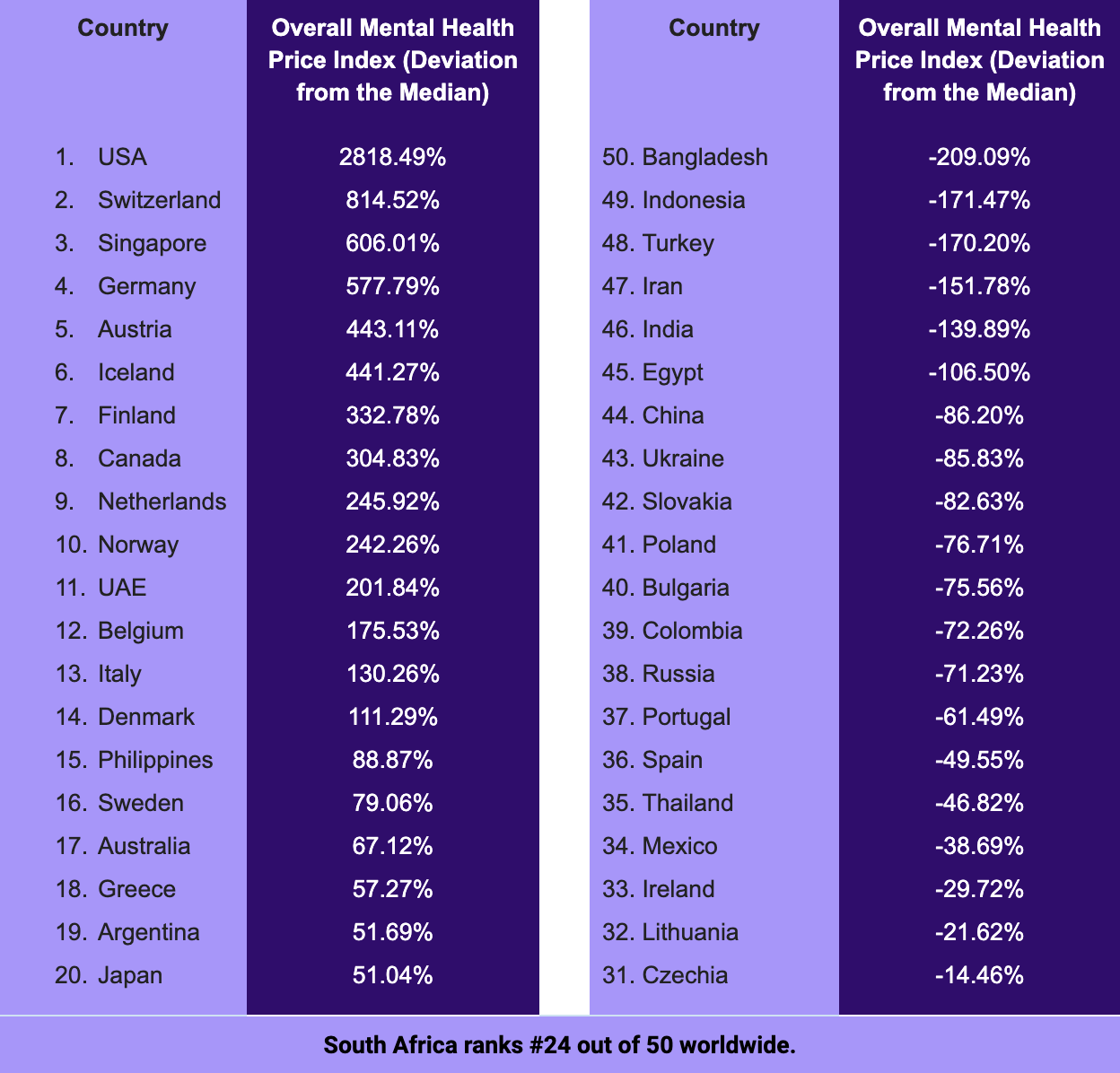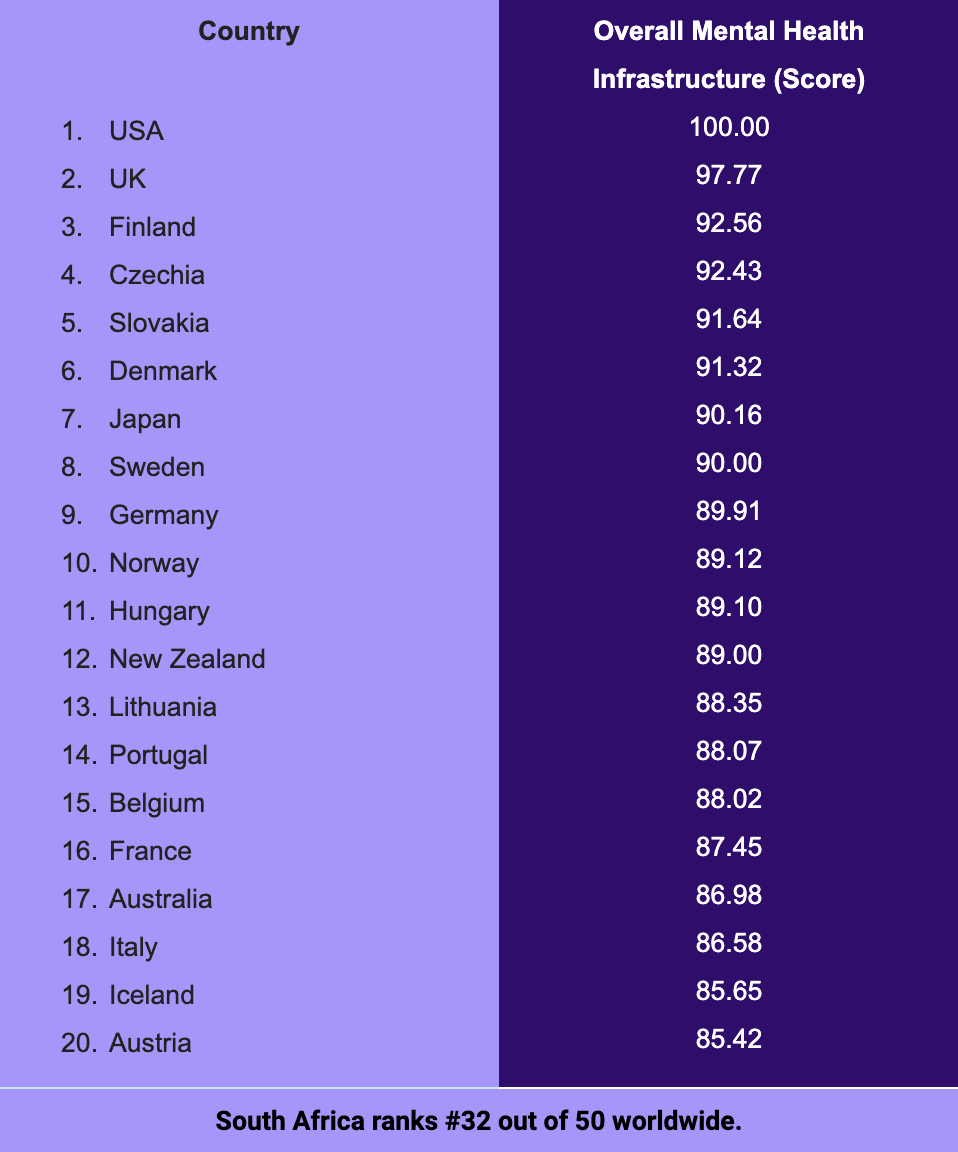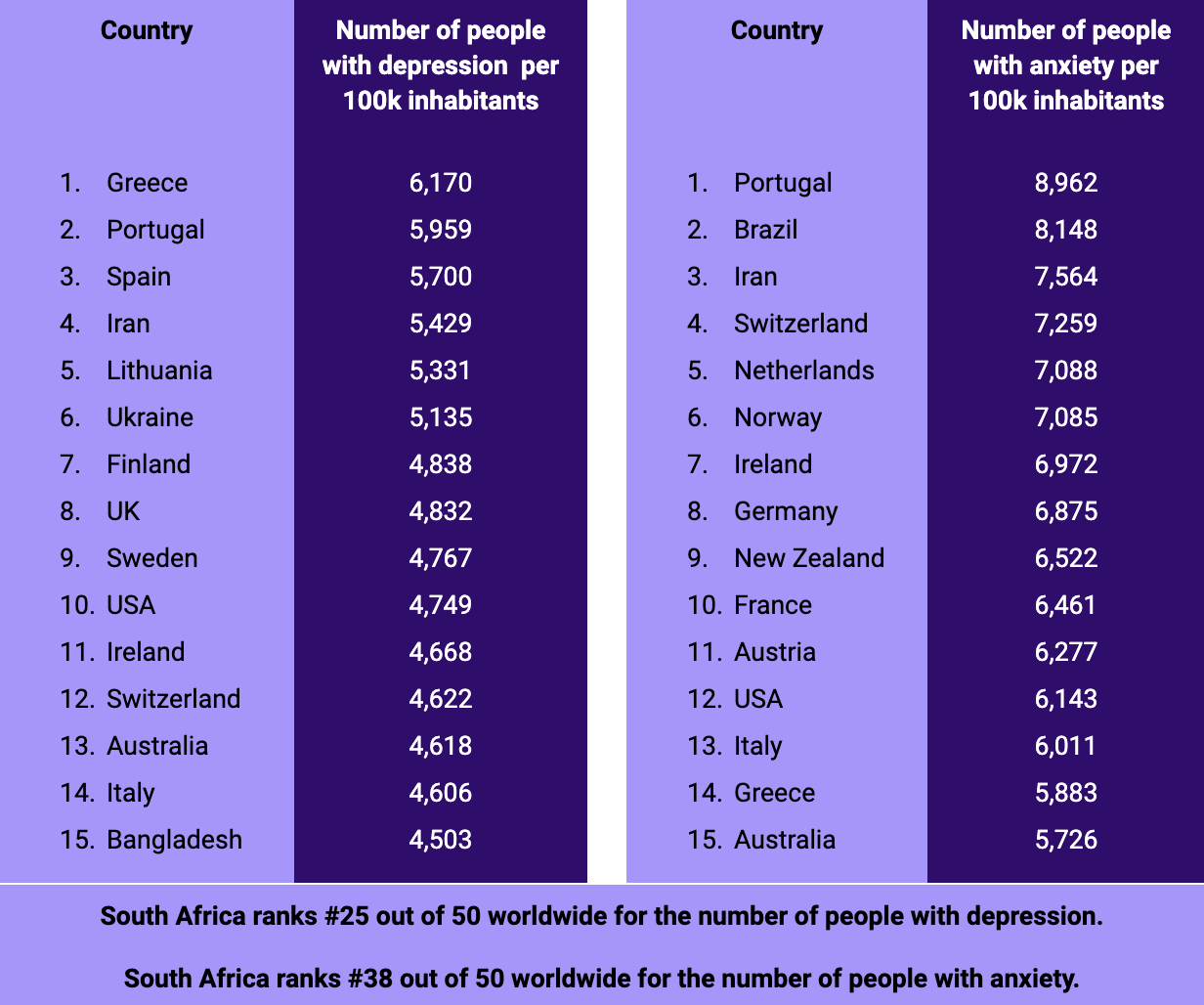In the context of mental health pressures from the pandemic and war in Ukraine, a new price index compares the cost and quality of mental health services around the world.
● Out of the 50 countries in the study, South Africa has the #24 most expensive mental healthcare.
● On average, the US has the most expensive mental healthcare, at an overall deviation of 2,818% above the global median. Bangladesh has the cheapest mental healthcare at 209.09% below the global median.
● The US ranks best for mental health infrastructure, ahead of the UK and Finland.
● Overall, Germany has the most expensive mental healthcare in the EU at 578% above the global median price.
● Therapy sessions are most expensive in Switzerland at $206 per hour on average, followed by the UAE ($163) and Norway ($143).
kenkou.io, the provider of integrable health monitoring solutions, has released a study comparing the price and quality of mental healthcare around the world. As first-hand observers of the impact of the pandemic and war in Ukraine on mental health services, the company conducted the study using data to better understand the countries best equipped to deal with the current mental healthcare crisis.
“At kenkou, we’ve witnessed the devastating effects of the pandemic on the global mental healthcare sector. Though we as a company are looking to find innovative solutions to the current strain on healthcare services, it is important to draw attention to this vital sector and the necessity for affordable, good quality mental healthcare for everyone,” said Matthias Puls, CEO and managing sirector of kenkou. “It must be noted that direct comparison between different countries in the study is not always useful, given the difference in purchasing power between the Global North and South, for instance. Nevertheless, we undertook this study to better understand the healthcare market and felt that, during this unprecedented period of disruption to mental healthcare, the findings would be of great value to all.”
How the study was conducted
The study began by analysing the mental healthcare data of more than 120 countries. After an initial review of the accuracy and reliability of data, 50 countries were shortlisted. To gain a more comprehensive understanding of mental healthcare globally, countries were assessed based on the cost of care, cost of medicines and prevalence of mental health conditions, and access to and quality of care.
To account for the different doses and brands of medicine, generic pharmacy prices were analysed alongside branded versions and expressed as a deviation from the median price, the midpoint of the dataset. In cases where raw price data were collected such as the cost of care category, researchers converted all local currencies into USD to achieve comparable data.
Last, to gain a fuller insight into the access to and quality of care as well as the cost of mental healthcare in each country, an overall score for mental health infrastructure was calculated, taking into consideration all factors related to access to and quality of care. In tandem, the overall mental health price index was expressed as a deviation from the median, the midpoint of the dataset.
Data were taken from sources including the World Health Organization (WHO), EUROSTAT, Organisation for Economic Co-operation and Development (OECD) and the Institute for Health Metrics and Evaluation.
Findings
The table below reveals the top 20 most and least expensive countries for mental healthcare. The overall mental health price score combines the cost of care and cost of medicine categories and is calculated as a deviation from the dataset median, the midpoint of the dataset. A higher score indicates a greater deviation above the dataset average and more expensive prices.
 The table below reveals the 20 countries with the best mental healthcare infrastructure. Scores were calculated using data on psychologists and psychiatrists per capita, quality of mental healthcare, as well as physical and digital access to mental healthcare. All scores are out of 100, with 100 being the highest possible score.
The table below reveals the 20 countries with the best mental healthcare infrastructure. Scores were calculated using data on psychologists and psychiatrists per capita, quality of mental healthcare, as well as physical and digital access to mental healthcare. All scores are out of 100, with 100 being the highest possible score.

From left to right, the tables below reveal a sample of results for the countries with the highest number of people living with depression and the highest number of people living with anxiety.

South Africa ranks #38 out of 50 worldwide for the number of people with anxiety.
Key Findings
● According to the study, Chile has the highest number of psychologists per 100k population at 271.62, followed by Portugal in second and Argentina in third.
● Greece has the highest number of people living with both depression and stress, at 6171 and 59,000 people per 100k respectively.
● Of the countries in the EU, a one-hour therapy session is most expensive in Sweden, followed by the Netherlands and Ireland.
“Since the pandemic and with mental healthcare services stretched to breaking point, it is evident that the sector is in urgent need of help. Regrettably, given the well-established connection between mental health conditions such as stress and development of chronic diseases, there is a very real risk that the current mental healthcare crisis could spill into the broader healthcare sector with widespread ramifications,” said Puls.
“It was fascinating to see that the countries scoring highest for digital access to mental healthcare did not necessarily correlate with those offering the best physical access to mental healthcare,” he said. “It is clear that some countries have already embraced the digitalisation of healthcare and can act as leading lights in finding innovative solutions to the current mental healthcare crisis.”
“Stress is a widely recognised and major problem worldwide,” said Dr Sylvain Laborde, senior lecturer at the German Sport University Cologne. “The only chance of avoiding the evolution of stress into depression or other mental conditions is to find out how to measure our vital signs in the most convenient and fast way, which is technology.”
Full kenkou dataset (Open access)
Issued by kenkou
